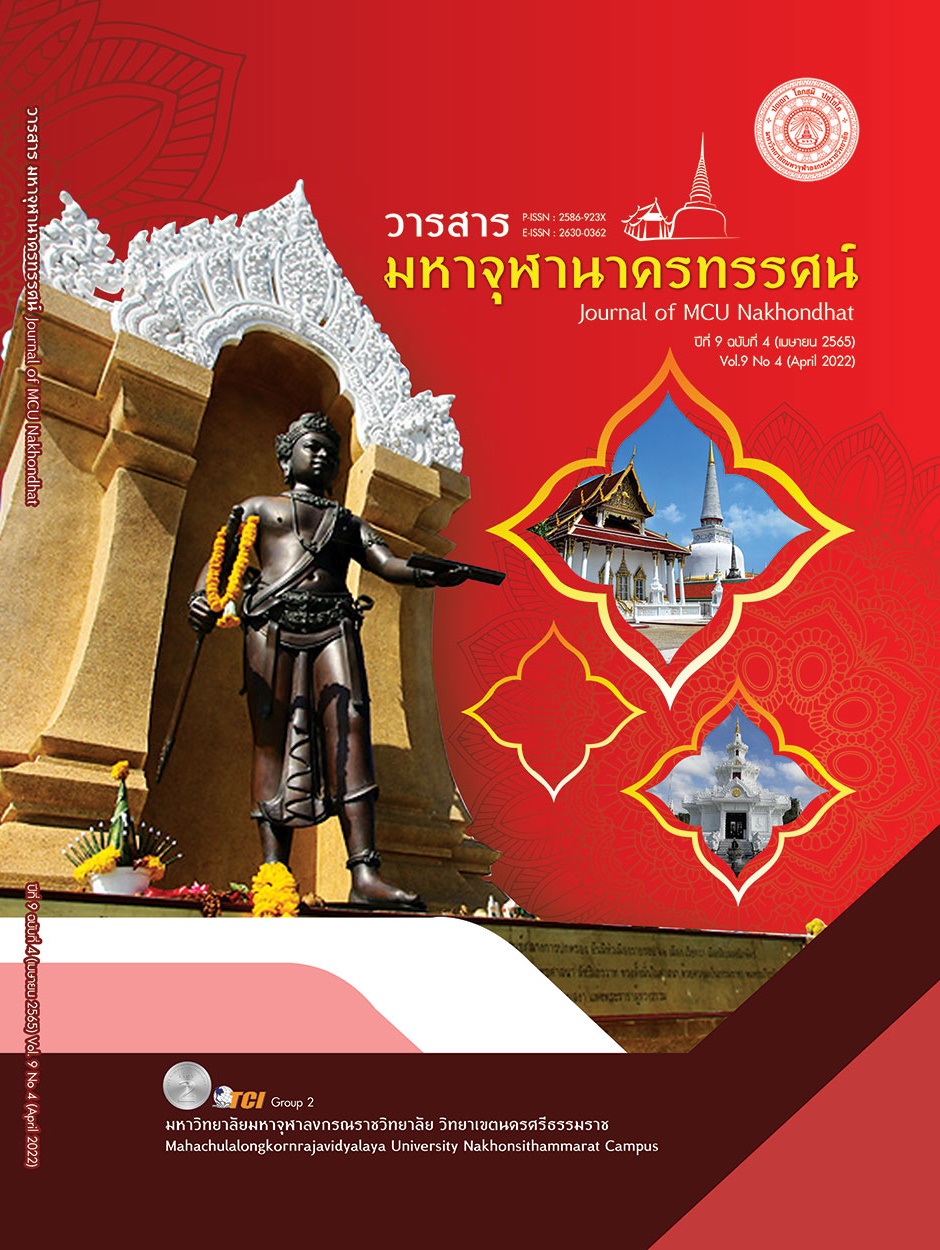CITIZEN CONTEXT IN PUBLIC POLICY
Main Article Content
Abstract
This article presents the dynamics in the citizen context in public policy. When it comes to citizenship under a democratic regime, it should be borne in mind that “citizen rights” are rights in which everyone is equally protected from the law and the judicial process. The right to participate in decisions about the use of resources and the right to control and monitor the exercise of state powe. The “citizen duty” is the active duty of overseeing and monitoring the exercise of state power. where supervision and inspection. In the development of citizens under democratic rule, there must be a parallel between the creation of citizens as individuals. be a strong citizen have a political culture of citizens Have a strong civic consciousness. To support citizens who were developed to be full citizens and lead to the creation of public policy, a policy that the state operates to meet the needs of the people Help to solve problems in the lives of the people better. Therefore, public policy and advocacy for citizenship driven by the state It is a policy to reform the country towards a welfare state or a society like that must be through a democratic society. Since the policy will lead to the welfare state or reform the country, what must be done first is The democratization of the country's structure by having to start making the supreme power in governing the country truly belong to the people. Including enabling every political institution or constitutional institution to be in a position where they must be and play a role in a democratic constitution Public policy is therefore very important to society and the nation. because it affects the lives of the people of the whole country.
Article Details

This work is licensed under a Creative Commons Attribution-NonCommercial-NoDerivatives 4.0 International License.
References
ชัยอนันต์ สมุทวณิช. (2565). การศึกษาเพื่อสร้างพลเมืองในสังคมประชาธิปไตย (Civic Education). เรียกใช้เมื่อ 19 มกราคม 2565 จาก http://www.fpps.or.th/ news.php? detail=n1
ไชยรัตน์ เจริญสินโอฬาร. (2545). สัญวิทยา โครงสร้างนิยม หลังโครงสร้างนิยมกับการศึกษา รัฐศาสตร์. กรุงเทพมหานคร: วิภาษา.
ถวิลวดี บุรีกุล รัชวดี แสงมหะหมัด. (2547). การมีส่วนร่วมทางการเมืองของประชาชนและความคิดเห็นต่อการทำงานของรัฐบาลและองค์กรอิสระ. ใน (ชุดโครงการวิจัยการติดตามและประเมินผลบังคับ ใช้รัฐธรรมนูญ). กรุงเทพมหานคร: สถาบันพระปกเกล้า.
ถวิลวดี บุรีกุล รัชวดี แสงมหะหมัด. (2554). ความเป็นพลเมืองในประเทศไทย. กรุงเทพมหานคร: สถาบันพระปกเกล้า.
ธเนศวร์ เจริญเมือง. (2548). แนวคิดว่าด้วยความเป็นพลเมือง. นนทบุรี: บริษัทโรงพิมพ์ คลังวิชา จำกัด.
ธีรศักดิ์ สุขสันติกมล. (2559). การเปลี่ยนแปลงทางสังคมในโลกยุคทันสมัย. วารสารมนุษยสังคมปริทัศน์, 18(1), 81-90.
นิภาพรรณ เจนสันติกุล. (2556). โครงสร้างทางสังคม บทบาทและนโยบายสาธารณะกับความเป็นพลเมือง. วารสารศิลปะศาสตร์, 5(1), 49-62.
รงค์ บุญสวยขวัญ. (2560). การเมืองของนโยบาย (Politics of Policy). Journal of Yanasangvorn Research Institute. , 8(1), 197-203.
รัชเกล้า กองแก้ว. (2559). ความเป็นพลเมืองไทย: แนวคิดพื้นฐานในการขับเคลื่อนสังคม. ใน หลักสูตร การปกครองกันราชอาณาจักรุ่นที่ 59 ประจําปีการศึกษา พุทธศักราช 2559-2560. กรุงเทพมหานคร: สถาบันวิชาการครองกันประเทศ.
รุ้งนภา ยรรยงเกษมสุข และสุธี ประศาสน์เศรษฐ. (2564). วัฒนธรรมทางการเมืองของไทย: ปัญหาเชิงโครงสร้าง. วารสารเศรษฐศาสตร์การเมืองบูรพา, 6(2), 69-89.
วรากรณ์ สามโกเศศ. (2565). การศึกษาเพื่อสร้างความเป็นพลเมือง. เรียกใช้เมื่อ 19 มกราคม 2565 จาก http://www.moe.go.th/moe/th/news/detail.php?NewsID=22720 &Key= hotnews
วัชรา ไชยสาร. (2545). กระบวนการมีส่วนร่วมในทางการเมืองกับการเมืองภาคประชาชน. รัฐสภาสาร, 53(5), 44-98.
สถาบันพระปกเกล้า. (2555). ความเป็นพลเมืองกับอนาคตประชาธิปไตยไทย. ใน เอกสารประกอบการประชุมวิชาการสถาบันพระปกเกล้า ครั้งที่ 13 ประจำปี 2554 เล่ม 2. กรุงเทพมหานคร: สถาบันพระปกเกล้า.
สมชาย แสวงการ. (2558). สร้างความเป็นพลเมืองไทยในระบอบประชาธิปไตย. ใน หลักสูตรหลักนิติธรรมเพื่อประชาธิปไตย รุ่นที่ 3. วิทยาลัยรัฐธรรมนูญ สำนักงานศาลรัฐธรรมนูญ.
สัญญา สัญญาวิวัฒน์. (2550). ทฤษฎีสังคมวิทยา เนื้อหาและแนวทางการใช้ประโยชน์เบื้องต้น. กรุงเทพมหานคร: จุฬาลงกรณ์มหาวิทยาลัย.
สำนักงานเลขาธิการสภาการศึกษา. (2554). ยุทธศาสตร์พัฒนาการศึกษาเพื่อสร้างความเป็นพลเมือง พ.ศ. 2553-2561. กรุงเทพมหานคร: ห้างหุ้นส่วนจำกัด วี.ที.ซี. คอมมิวนิเคชั่น.
สำนักงานศาลรัฐธรรมนูญ. (2554). รัฐธรรมนูญแห่งราชอาณาจักรไทย พ.ศ. 2550 (แก้ไขเพิ่มเติม พ.ศ. 2554). กรุงเทพมหานคร: สำนักงานศาลรัฐธรรมนูญ.
สุภางค์ จันทวานิช. (2551). ทฤษฎีสังคมวิทยา. กรุงเทพมหานคร: จุฬาลงกรณ์มหาวิทยาลัย.
อภิญญา ฉัตรช่อฟ้า. (2564). การสร้างและพัฒนาความเป็นพลเมืองภายใต้การปกครองระบอบประชาธิปไตย. Journal of Social Science and Buddhistic Anthropology, 6(3), 121-134.
อิงฟ้า สิงห์น้อย และรัฐชาติ ทัศนัย. (2561). นโยบายสาธารณะ: การบริหารและการจัดการภาครัฐ. วารสารสันติศึกษาปริทรรศน์มจร, 6(ฉบับพิเศษ), 611-623.
Heater, D. (1990). Citizenship: The civic ideal in world history, politics and education. London: Longman.
Jantawan, N. (2016). Democratic Citizenship: A Case Study of Undergraduates at the Main Campus of Ramkhamhaeng University. Academic Jounal Phranakhon Rajabhat University, 7 (1), 103-113.
Jensantikul, N. (2013). Social structure, role and public policy with the citizenship. Journal of Liberal Arts Prince of Songkla University Hat Yai, 5 (1), 49-62.


